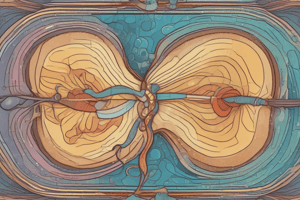Podcast
Questions and Answers
Which of the following is a common symptom of benign prostatic hyperplasia (BPH)?
Which of the following is a common symptom of benign prostatic hyperplasia (BPH)?
- Difficulty in breathing
- Increased appetite
- Chest pain
- Difficulty in urination (correct)
Which grade of benign prostatic hyperplasia (BPH) is characterized by permanent micturition disturbance and a maximal urinary flow of less than 10ml/sec?
Which grade of benign prostatic hyperplasia (BPH) is characterized by permanent micturition disturbance and a maximal urinary flow of less than 10ml/sec?
- Grade 1
- Grade 4 (correct)
- Grade 3
- Grade 2
What is the recommended therapy for Grade II phase of benign prostatic hyperplasia (BPH)?
What is the recommended therapy for Grade II phase of benign prostatic hyperplasia (BPH)?
- Alcohol abstinence and avoiding low temperature
- Pharmacotherapy or phytotherapy
- Spasmolytics and bowel regulation (correct)
- Surgery: TURP or prostatectomy
Which plants are used for treatment in therapy?
Which plants are used for treatment in therapy?
What are the important constituents of Serenoa Repens (Saw Palmetto)?
What are the important constituents of Serenoa Repens (Saw Palmetto)?
What undesirable effect may occur when using Serenoa Repens (Saw Palmetto)?
What undesirable effect may occur when using Serenoa Repens (Saw Palmetto)?
Which one of the following is a common symptom of benign prostatic hyperplasia (BPH)?
Which one of the following is a common symptom of benign prostatic hyperplasia (BPH)?
Which grade of benign prostatic hyperplasia (BPH) is characterized by intermittent micturition disturbance and a maximal urinary flow of 10-15ml/sec?
Which grade of benign prostatic hyperplasia (BPH) is characterized by intermittent micturition disturbance and a maximal urinary flow of 10-15ml/sec?
What is the recommended therapy for Grade III residual volume phase of benign prostatic hyperplasia (BPH)?
What is the recommended therapy for Grade III residual volume phase of benign prostatic hyperplasia (BPH)?
Which enzyme does Serenoa Repens (Saw Palmetto) inhibit in the prostate?
Which enzyme does Serenoa Repens (Saw Palmetto) inhibit in the prostate?
What is the pharmacotherapeutic group of Serenoa Repens (Saw Palmetto)?
What is the pharmacotherapeutic group of Serenoa Repens (Saw Palmetto)?
Which medicinal product has been reported to have potential interactions with Serenoa Repens (Saw Palmetto)?
Which medicinal product has been reported to have potential interactions with Serenoa Repens (Saw Palmetto)?
Which of the following is a common symptom of benign prostatic hyperplasia (BPH)?
Which of the following is a common symptom of benign prostatic hyperplasia (BPH)?
What is the recommended therapy for Grade I phase of benign prostatic hyperplasia (BPH)?
What is the recommended therapy for Grade I phase of benign prostatic hyperplasia (BPH)?
Which enzyme does Serenoa Repens (Saw Palmetto) inhibit in the prostate?
Which enzyme does Serenoa Repens (Saw Palmetto) inhibit in the prostate?
Which plant is used for treatment of benign prostatic hyperplasia (BPH) and inhibits the enzyme responsible for converting testosterone to dihydrotestosterone in the prostate?
Which plant is used for treatment of benign prostatic hyperplasia (BPH) and inhibits the enzyme responsible for converting testosterone to dihydrotestosterone in the prostate?
Which plant contains a specific androgen receptor antagonist and esters of ferulic acid with anti-inflammatory effects?
Which plant contains a specific androgen receptor antagonist and esters of ferulic acid with anti-inflammatory effects?
Which plant has the potential to interact with warfarin and may increase INR values?
Which plant has the potential to interact with warfarin and may increase INR values?
What is the main activity of Serenoa Repens (Saw Palmetto) in the prostate?
What is the main activity of Serenoa Repens (Saw Palmetto) in the prostate?
Which undesirable effect may occur when using Serenoa Repens (Saw Palmetto)?
Which undesirable effect may occur when using Serenoa Repens (Saw Palmetto)?
Which grade of benign prostatic hyperplasia (BPH) is characterized by a bladder wall that starts to be thickened?
Which grade of benign prostatic hyperplasia (BPH) is characterized by a bladder wall that starts to be thickened?
What is the recommended therapy for Grade III residual volume phase of benign prostatic hyperplasia (BPH)?
What is the recommended therapy for Grade III residual volume phase of benign prostatic hyperplasia (BPH)?
Which symptom is associated with Grade IV phase of benign prostatic hyperplasia (BPH)?
Which symptom is associated with Grade IV phase of benign prostatic hyperplasia (BPH)?
Which grade of benign prostatic hyperplasia (BPH) is characterized by a bladder wall that starts to be thickened?
Which grade of benign prostatic hyperplasia (BPH) is characterized by a bladder wall that starts to be thickened?
Which enzyme does Serenoa Repens (Saw Palmetto) inhibit in the prostate?
Which enzyme does Serenoa Repens (Saw Palmetto) inhibit in the prostate?
Which plant is used for the treatment of benign prostatic hyperplasia (BPH)?
Which plant is used for the treatment of benign prostatic hyperplasia (BPH)?
What are the important constituents of Serenoa Repens (Saw Palmetto)?
What are the important constituents of Serenoa Repens (Saw Palmetto)?
Which undesirable effect may occur when using Serenoa Repens (Saw Palmetto)?
Which undesirable effect may occur when using Serenoa Repens (Saw Palmetto)?
Flashcards are hidden until you start studying
Study Notes
Benign Prostatic Hyperplasia (BPH)
- A common symptom of BPH is nocturia (frequent nighttime urination)
BPH Grades
- Grade I: characterized by minimal symptoms
- Grade II: characterized by intermittent micturition disturbance and a maximal urinary flow of 10-15ml/sec
- Grade III: characterized by permanent micturition disturbance and a maximal urinary flow of less than 10ml/sec
- Grade IV: characterized by a bladder wall that starts to be thickened, and symptoms such as urinary retention and incontinence
Treatment of BPH
- Recommended therapy for Grade I BPH: watchful waiting
- Recommended therapy for Grade II BPH: medical therapy
- Recommended therapy for Grade III residual volume BPH: surgery
Serenoa Repens (Saw Palmetto)
- Used for treatment of BPH
- Important constituents: phytosterols, fatty acids, and flavonoids
- Inhibits the enzyme 5-alpha-reductase in the prostate, which converts testosterone to dihydrotestosterone
- Pharmacotherapeutic group: plant-based medication
- May interact with warfarin and increase INR values
- Undesirable effect: gastrointestinal disturbances
Other Plants Used for BPH Treatment
- Some plants used for BPH treatment inhibit the enzyme responsible for converting testosterone to dihydrotestosterone in the prostate
- Some plants contain specific androgen receptor antagonists and esters of ferulic acid with anti-inflammatory effects
Studying That Suits You
Use AI to generate personalized quizzes and flashcards to suit your learning preferences.




